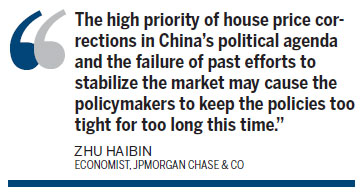Policies chill property sales
|
Potential homebuyers examine a developer's display in Qingdao, Shandong province, during the Lunar New Year holiday. Residential transactions in major cities slumped in 2011 and prospects are bleak for this year. Yu Fangping / for China Daily |

Lunar New Year holiday season proves to be the bleakest time for real estate firms
BEIJING - China's major cities saw a drop in property sales during the Lunar New Year holiday, indicating a further correction in the real estate market.
SouFun Holdings Ltd, China's largest property website, said on Monday that among the 29 cities it monitors, 27 experienced a drop in property transactions.
Property sales in Guangzhou plunged by 81.5 percent year-on-year. Those in Shanghai and Shenzhen also fell by more than 30 percent on a yearly basis, according to SouFun. Statistics for Beijing are not available because the capital's website on property transactions was closed during the festival.
Four second-tier cities - Jinan, Wuxi, Harbin and Ningbo - saw no transactions at all, SouFun statistics showed.
According to Chen Guang, an analyst with Century 21 China, this Lunar New Year was the bleakest period since 2004.
"It will not be surprising to see a further drop in property transactions because there is no sign that restrictive policies will be loosened this year. Some property developers have even shut down sales offices," said Chen.
"Given the current situation, it is almost certain China's property market will undergo a further correction in the first quarter," Chen added.
Potential homebuyers also expect a further decline in the property market. According to WorldUnion Properties, people's willingness to buy a home reached a record low in the fourth quarter, down 2.4 percentage points from the previous quarter.
"Only a big price cut, between 10 and 15 percent for instance, would really stimulate consumers to buy," said Liu Chunyan, general manager of Beijing WorldUnion Properties Consultancy Co Ltd.
Investment bank JP Morgan Chase & Co said in a research note on Monday that it expects a house price correction of 5 to 10 percent at the national level, with price declines of 15 to 20 percent in some first-tier cities.
"Although the likelihood of a collapse remains small, we cannot preclude the possibility of an over-shooting in the housing market correction," said Zhu Haibin, economist with JP Morgan.
The government has reiterated that its tightening measures will continue, without any clear indication of its exit strategy.
Chinese banks extended a total of 1.26 trillion yuan ($199.4 billion) in new loans to property developers and homebuyers last year, down 38 percent from 2010, the central bank said in a statement on its website on Monday.
Property loans accounted for 17.5 percent of total new loans issued in 2011, compared with 26.9 percent in 2010. Outstanding loans to property developers rose 17 percent from a year earlier to 2.72 trillion yuan at the end of last year, compared with a rise of 23 percent at the end of 2010.
"The high priority of house price corrections in China's political agenda and the failure of past efforts to stabilize the market may cause the policymakers to keep the policies too tight for too long this time," said Zhu.
"The weakness in the housing market poses a major domestic risk for the China economy."



















